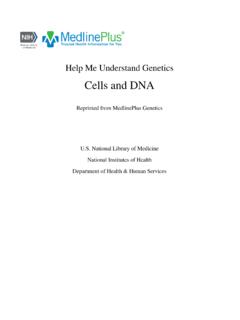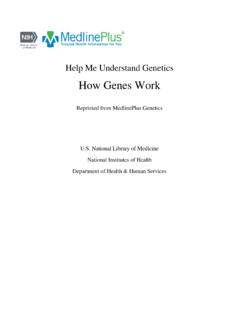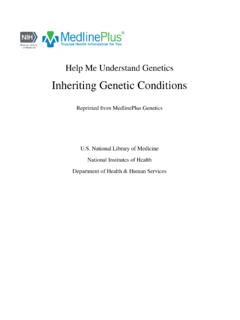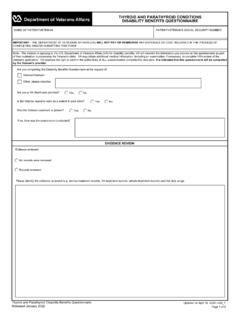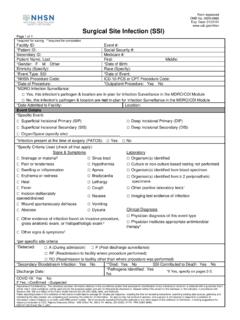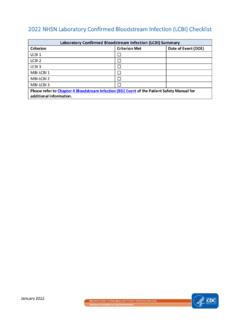Transcription of Understanding Medical Words Tutorial
1 Page 1 of 25 MedlinePlus: Understanding Medical Words Tutorial From the National Library of Medicine Chapters: 1. Introduction 2. Break It Up 3. Word Roots 4. Beginnings and Endings 5. Abbreviations 6. Learn More What's in this for me? Find out why you and your doctor sometimes are speaking different languages. Learn how to put together parts of Medical Words . See what you've learned by taking short quizzes. Learn more with links to lists of word parts and abbreviations. Get the reference material for this Tutorial . Page 2 of 25 Introduction What did the doctor say? Do you ever feel as if you and your doctor weren't speaking the same language?
2 Sometimes even Words that you think you understand can have a different meaning to your doctor. For example: heart attack. Your uncle experienced the symptoms of what you understand to be a heart attack, including: racing heartbeat chest pain shortness of breath passing out Your uncle's heart stopped beating! Luckily, the emergency responders used CPR and revived him. Later when you re talking to the doctor, you say how glad you are that he survived his heart attack. The doctor says, "He didn't have a heart attack. He had a cardiac arrest; but no muscle damage." What does the doctor mean? What is going on? To you, a heart attack means the heart doesn't beat. To the doctor, a heart attack means there is damage to the heart muscle.
3 Another example: fever. You take your child s temperature and it is degrees. You call the doctor and say your child has a fever of degrees. She says, "That's not a fever." What does she mean? What is going on? To you, a fever is anything above degrees. To the doctor, a fever is a temperature over degrees. You and your doctor sometimes are speaking a different language; but using the same Words . Page 3 of 25 So what can you do? If what you're hearing doesn't make sense, make sure to ask questions! You can also use the MedlinePlus website, MedlinePlus: Health Topics or MedlinePlus: Word Parts to find out more about meanings of the Medical Words . Now let's look at a couple of tongue-twisting, big Words .
4 Colonoscopic polypectomy Esophagogastroduodenoscopy These next Words sound alike and are similar in spelling, but one is high blood sugar and one is low blood sugar. Hyperglycemia Hypoglycemia These next two Words also sound alike, but one is a painful problem with your joints and the other is a disease that makes your bones weak. Osteoarthritis Osteoporosis What did the doctor just say? Did she say you needed a colonoscopic polypectomy? What on earth do those two Words mean? You need a what? Transesophageal echocardiogram! What is that? Medical Words can be long and confusing. Let's figure out what these Words mean. Page 4 of 25 Break It Up!
5 Some Medical Words are made up of multiple parts. They might make more sense if you break the word into different parts. Breaking up isn't hard to do! Long Medical Words can have a: Beginning (or prefix): If there's a beginning, it can be about size, shape, color, direction, and amount. Middle (or root): The middle is often a part of the body. Ending (or suffix): If there's an ending, it can be about the same thing as the beginning, like size, or it can be about a test or it can describe a problem. Breaking up long Words . Transesophageal has a: Beginning (or prefix) of trans Middle (or root) of esophagi Ending (or suffix) of eal Echocardiogram has a: Beginning (or prefix) of echo Middle (or root) of cardio Ending (or suffix) of gram Things to remember: Not all Medical Words have a beginning or ending.
6 Sometimes word pieces can appear in different places, like cardi in these Words cardiologist and myocardial. We'll cover what those Words mean in the upcoming chapters. Try a short quiz #1 Let s See What You Know or proceed to the next chapter Words Roots. Page 5 of 25 Quiz #1, Let s See What You Know Question 1 of 3: A word for inflammation of the throat. The Words ends in -itis, select the beginning. ot tonsil encephal rhin neur pharyng Question 1 answer is pharyng for pharyngitis. Question 2 of 3: A word for disease of the nerves. The word begins with neuro-, select the ending. itis scopy logy pathy megaly gram Question 2 answer is pathy for neuropathy.
7 Question 3 of 3: The word for a person working with the nerves. The word ends in -ologist, select the beginning. ophthal neur cardi mamm colon gastr Question 3 answer is neur for neurologist. Great job! Page 6 of 25 Word Roots Let's begin with some basic body parts. The root of a Medical word is usually a body part. Bone is oste Muscle is myo Nerves is neur Skin is derm The root of echocardiogram is cardio. It means heart. Here are some roots for your heart and blood vessels. Your heart is cardio Your veins and arteries are vas or vasc The system of heart and blood vessels is sometimes called the cardiovascular system Here are more roots for your heart and blood vessels.
8 Blood is hem or hemo or sangu Blood vessels are angi or angio Veins are ven or veno or phleb or phlebo Aorta is aort Heart is cardi or cardio Arteries are arteri or arterio Page 7 of 25 Here are word roots for parts of your head. Brain is enceph Nose is rhino Eardrum is tympan or myringo Tooth is odont or dento Skull is crani Eye is ophthalm or oculo Ear is oto Tongue is lingu Page 8 of 25 Here are word roots for your digestive organs. Liver is hepat or hepato Gallbladder is cholecyst Esophagus is esoph or esopha Large intestine is colo Stomach is gastr or gastro Small intestine is ileo Page 9 of 25 A quick review of what we covered so far.
9 Brain is enceph Eye is ocul or oculo Nose is rhino Liver is hepat or hepato Head is ceph Heart is cardi or cardio Stomach is gastr or gastro Large intestine is colo These are root Words for the other areas of your body. Chest is thorac or thoraco Lung is pneumo or pleura Breast is mamm or mammo Blood clot is thromb or thrombo Kidney is neph Page 10 of 25 Root Words for specific bones and muscles areas of your body. Muscles is myo Shoulder is scapula Arm is brachi or brachio Wrist is carp or carpo Rib is cost or costo Back is dorsa Bones are oste or osteo Foot is pod or podo or ped or pedo Page 11 of 25 Sometimes a memory shortcut will help you remember Words , like gastro for stomach or intestines.
10 Think of one of the things your digestive system produces gas! And a picture is worth a thousand Words . Rhino is nose. Think rhinoceros! You can find more information at Medlineplus: Word Parts and What They Mean. Try a quiz on word roots with quiz #2, Let s Practice Roots or proceed to the next chapter Beginnings and Endings. Page 12 of 25 Quiz #2, Let's Practice Roots Question 1 of 8: The word for a picture of the ultrasonic waves your heart makes is an echo-[blank]-gram. Select the correct word part to fill in the blank. cephalo arterio neuro cardio osteo oto Question 1 answer is cardio for echocardiogram. Question 2 of 8: The word for the study of the bones is [blank]-ology.
